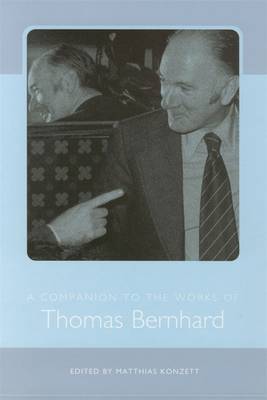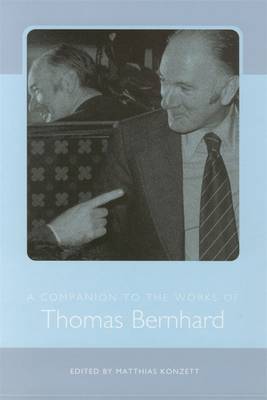
Vous voulez être sûr que vos cadeaux seront sous le sapin de Noël à temps? Nos magasins vous accueillent à bras ouverts. La plupart de nos magasins sont ouverts également les dimanches, vous pouvez vérifier les heures d'ouvertures sur notre site.
- Retrait gratuit dans votre magasin Club
- 7.000.000 titres dans notre catalogue
- Payer en toute sécurité
- Toujours un magasin près de chez vous
Vous voulez être sûr que vos cadeaux seront sous le sapin de Noël à temps? Nos magasins vous accueillent à bras ouverts. La plupart de nos magasins sont ouverts également les dimanches, vous pouvez vérifier les heures d'ouvertures sur notre site.
- Retrait gratuit dans votre magasin Club
- 7.000.0000 titres dans notre catalogue
- Payer en toute sécurité
- Toujours un magasin près de chez vous
A Companion to the Works of Thomas Bernhard
64,45 €
+ 128 points
Description
New essays by leading scholars on major aspects of the most significant Austrian writer of the postwar generation. Since the death of Thomas Bernhard in 1989, the literary reputation of this complex and unique writer has risen to the point that he is now regarded as a major European figure. Bernhard emerged in the 1960s as one of Austria's major writers, challenging the popularity of such established writers as Heinrich Böll and Günter Grass on the German literary scene. His idiosyncratic prose consists of a tragic-comic blend of themes such as suicide, madness, and isolation combined with highly satirical and histrionic invectives against culture, tradition, and society. As a skillful impresario of public scandals by means of verbal assaults upon Austrian elite culture, Bernhard also earned himself the epithet of Übertreibungskünstler (artist of exaggeration). In this art of cultural and political provocation Bernhard remains unmatched to the present day. This volume of essays provides contributions by well-known critics that examine the most salient aspects of Bernhard's work, offering insights into literary strategies and public themes that made Bernhard one of Europe's masters of modern prose and drama. Essays examine Bernhard's complex artistic sensibility, his impact on Austria's critical memory, his relation to the legacy of Austrian Jewish culture, his representative value as Austria's prime literary export, and his cosmopolitanism and its significance forthe rapidly changing multicultural landscape of Europe.
Matthias Konzett is associate professor of German at Yale University. He is the author of The Rhetoric of National Dissent in Thomas Bernhard, Peter Handke, and Elfriede Jelinek (Camden House, 2000). Click here to view the introduction (PDF file 97KB)
Matthias Konzett is associate professor of German at Yale University. He is the author of The Rhetoric of National Dissent in Thomas Bernhard, Peter Handke, and Elfriede Jelinek (Camden House, 2000). Click here to view the introduction (PDF file 97KB)
Spécifications
Parties prenantes
- Editeur:
Contenu
- Nombre de pages :
- 264
- Langue:
- Anglais
- Collection :
- Tome:
- n° 64
Caractéristiques
- EAN:
- 9781571134615
- Date de parution :
- 01-06-10
- Format:
- Livre broché
- Format numérique:
- Trade paperback (VS)
- Dimensions :
- 152 mm x 229 mm
- Poids :
- 394 g






